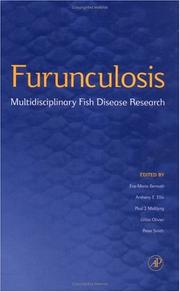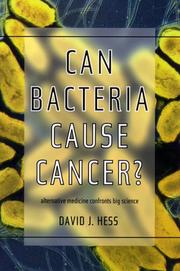| Listing 1 - 10 of 82 | << page >> |
Sort by
|
Book
ISBN: 9811473765 9789811473760 Year: 2020 Publisher: Singapore Bentham Science Publishers
Abstract | Keywords | Export | Availability | Bookmark
 Loading...
Loading...Choose an application
- Reference Manager
- EndNote
- RefWorks (Direct export to RefWorks)
Book
Year: 2023 Publisher: [Place of publication not identified] : MDPI - Multidisciplinary Digital Publishing Institute,
Abstract | Keywords | Export | Availability | Bookmark
 Loading...
Loading...Choose an application
- Reference Manager
- EndNote
- RefWorks (Direct export to RefWorks)
The Special Issue of Biomedicines, entitled "Advances in Pathogenesis and Therapeutics of Hepatobiliary Diseases," presents cutting-edge research findings, innovations, and insights into a wide range of topics related to the hepatobiliary system, such as the molecular mechanisms underlying disease pathogenesis, diagnostic advancements, novel therapeutic approaches, and prevention strategies. The Special Issue comprises seven original articles and four review articles regarding NAFLD, primary biliary cholangitis (PBC), hepatitis B and C, and hepatocellular carcinoma (HCC).
Bacterial diseases --- Bacterial diseases. --- Pathogenesis.
Book
ISBN: 019174042X 0199607540 1283348365 9786613348364 0191576026 Year: 2010 Publisher: Oxford ; New York : Oxford University Press,
Abstract | Keywords | Export | Availability | Bookmark
 Loading...
Loading...Choose an application
- Reference Manager
- EndNote
- RefWorks (Direct export to RefWorks)
Although antibiotics are among the most widely used pharmaceuticals, they are also often inappropriately and over-prescribed. Indeed there are increasing predictions that unless we moderate our use of these drugs, bacterial resistance will eventually render them useless. As there are no serious contenders to take the place of antibiotics, including a failure to find new classes of these drugs, it is essential for modern medicine that their efficacy is preserved.Part of the Oxford Infectious Disease Library, this pocketbook is designed to help medical trainees, general prescribers, healthcare w
Book
ISBN: 1773618334 9781773618333 Year: 2019 Publisher: Oakville, ON, Canada
Abstract | Keywords | Export | Availability | Bookmark
 Loading...
Loading...Choose an application
- Reference Manager
- EndNote
- RefWorks (Direct export to RefWorks)
Bacterial diseases --- Drug resistance in microorganisms. --- Prevention.
Book
ISBN: 1283050714 9786613050717 9048514460 9789048514465 9789056296803 Year: 2011 Publisher: Amsterdam Vossiuspers UvA
Abstract | Keywords | Export | Availability | Bookmark
 Loading...
Loading...Choose an application
- Reference Manager
- EndNote
- RefWorks (Direct export to RefWorks)
Overheidsaansprakelijkheid is een wonderlijk onderdeel van het recht en dat geldt ook voor schadevergoeding bij rechtmatige overheidsdaad. Voor juristen zijn nadeelcompensatie en planschade goed te begrijpen; burgers en ondernemers hebben daar veel meer moeite mee. Zowel procedureel als materieel is er veel onduidelijkheid. Dat geldt ook voor de invulling van het begrip normaal maatschappelijk risico: wat is normaal? De vraag komt op of er nog wel behoefte is aan een afzonderlijke wettelijke regeling voor planschade. Bepleit wordt het scheppen van een gemeenschappelijk kader voor planschade en

ISBN: 0120930404 9786611743284 1281743283 0080532225 9780120930401 9780080532226 Year: 1997 Publisher: San Diego ; London : Academic Press,
Abstract | Keywords | Export | Availability | Bookmark
 Loading...
Loading...Choose an application
- Reference Manager
- EndNote
- RefWorks (Direct export to RefWorks)
Furunculosis: Multidisciplinary Fish Disease Research presents a fascinating insight into the opinions and the controversies which have led to current knowledge of this disease. It is the first book to cover one single fish disease by presenting not just the reviews, but also critical examination of the progress made by various disciplines. The multidisciplinary approach of the book makes it a valuable guide for veterinarians, fisheries biologists, and fish farm managers, as well as an excellent instructional text for students. The volume explores current research strategies and project
Bacterial diseases in fishes. --- Furunculosis. --- Bacterial diseases in fishes --- Salmonidae --- Fishes --- Infections

ISBN: 0585321124 9780585321127 0814735614 9780814735619 0814735622 9780814735626 9780814744833 0814744834 Year: 1997 Publisher: New York New York University Press
Abstract | Keywords | Export | Availability | Bookmark
 Loading...
Loading...Choose an application
- Reference Manager
- EndNote
- RefWorks (Direct export to RefWorks)
Growing numbers of cancer patients are exploring diet, food supplements, herbs, and nontoxic immunotherapies like bacterial vaccines as a means of therapy. Yet most cancer research organizations refuse to even evaluate these alternatives. Can Bacteria Cause Cancer? argues convincingly that unless this neglected world of alternative therapies is properly scrutinized, the medical Vietnam of the twentieth century may well affect one in two people by the twenty-first century.David J. Hess investigates one of the great medical mysteries of the twentieth century--the relationship between bacteria and chronic disease. Recently scientists have overturned long-held beliefs by demonstrating that bacterial infections cause many ulcers; they are now reconsidering the role of bacterial infections in other chronic diseases, such as arthritis. Is it possible, Hess asks, that bacteria can contribute to the many other known causes of cancer?To answer this intriguing question, Hess takes us into the world of alternative cancer researchers. Maintaining that their work has been actively suppressed rather than simply dismissed, he examines their claims---that bacterial vaccines have led to some dramatic cases of long-term cancer remission--and the scientific potential of their theories. Economic interests and cultural values, he demonstrates, have influenced the rush toward radiation and chemotherapy and the current cul-de-sac of toxic treatments.More than a medical mystery story, Can Bacteria Cause Cancer? is a dramatic case study of the failure of the war on cancer.
Carcinogenesis --- Cancer --- Bacterial Diseases --- Alternative Medicine --- Medical --- Bacterial diseases --- Alternative medicine
Book
ISBN: 0674985079 0674985095 Year: 2018 Publisher: Cambridge, MA : Harvard University Press,
Abstract | Keywords | Export | Availability | Bookmark
 Loading...
Loading...Choose an application
- Reference Manager
- EndNote
- RefWorks (Direct export to RefWorks)
Antibiotics are powerful drugs that can prevent and treat infections, but they are becoming less effective as a result of drug resistance. Resistance develops because the bacteria that antibiotics target can evolve ways to defend themselves against these drugs. When antibiotics fail, there is very little else to prevent an infection from spreading. Unnecessary use of antibiotics in both humans and animals accelerates the evolution of drug-resistant bacteria, with potentially catastrophic personal and global consequences. Our best defenses against infectious disease could cease to work, surgical procedures would become deadly, and we might return to a world where even small cuts are life-threatening. The problem of drug resistance already kills over one million people across the world every year and has huge economic costs. Without action, this problem will become significantly worse. Following from their work on the Review on Antimicrobial Resistance, William Hall, Anthony McDonnell, and Jim O'Neill outline the major systematic failures that have led to this growing crisis. They also provide a set of solutions to tackle these global issues that governments, industry, and public health specialists can adopt. In addition to personal behavioral modifications, such as better handwashing regimens, Superbugs argues for mounting an offense against this threat through agricultural policy changes, an industrial research stimulus, and other broad-scale economic and social incentives.
Drug resistance in microorganisms. --- Bacterial diseases --- Medical policy. --- Prevention.
Book
ISBN: 0128180307 0128182385 9780128182383 9780128180303 Year: 2021 Publisher: London, England : Academic Press,
Abstract | Keywords | Export | Availability | Bookmark
 Loading...
Loading...Choose an application
- Reference Manager
- EndNote
- RefWorks (Direct export to RefWorks)
Bacterial diseases in animals. --- Swine --- Poultry --- Diseases. --- Communicable diseases in animals --- Veterinary bacteriology --- Poultry pests --- Bacterial diseases. --- Bacterial infections --- Communicable diseases --- Medical bacteriology --- Pathogenic bacteria
Book
ISBN: 0444520155 9780444520159 0444534830 9780444534835 Year: 2010 Publisher: Edinburgh ; New York : Elsevier,
Abstract | Keywords | Export | Availability | Bookmark
 Loading...
Loading...Choose an application
- Reference Manager
- EndNote
- RefWorks (Direct export to RefWorks)
Central nervous system --- Infections. --- Bacterial diseases. --- Bacterial infections --- Communicable diseases --- Medical bacteriology --- Pathogenic bacteria
| Listing 1 - 10 of 82 | << page >> |
Sort by
|

 Search
Search Feedback
Feedback About UniCat
About UniCat  Help
Help News
News